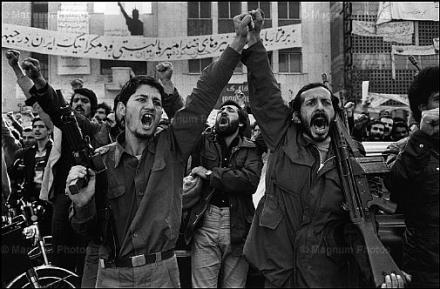
I am a commoner, a daughter to farmers and shepherds, an heir to callous hands, a remnant of toil and rustic life. In spite of what destiny has allotted for me and where providence has taken me, the greatest ambition of my being has always been to return to my roots, to revive the family farm, to cultivate the land, to reclaim the green pastures. Will this dream ever materialize? I think not.
My gloomy reply stems from the reality of a higher calling deeply rooted in the Iranian national psyche, a connection that is as ironic and profound as the genetic link binding us to our ancestors. It is the inescapable tragedy of untold lives. It is the inconvenient truth, Iranian style: Somewhere between the beginning and now, there was a detour, a diversion into politics, when the plow was laid down, and a fist rose into the air. It was a long time ago when the first warrior was born.
No one knows for sure what transpired. The legends passed down through word of mouth are often embellished by zealous storytellers and embroidered at the edges with heroic details. Feuds are turned into revolutionary principles while a just cause becomes a mere grudge. The catalyst may have been an uprising of serfs against a feudal landowner or perhaps a long drawn draught parching the pastures. The ember could have been the lashes of a landlord, the burden of over taxation, or simply an itchy trigger finger. It could have been the love affair between the peasant’s daughter and the aristocrat’s son, the unquenched thirst of wanting, coveting the unattainable. The initial spark might have come from an honor insulted, an ego bruised, or a holy relic desecrated.
Whatever took place so many moons ago sealed the Iranian national psyche: When the first blood was spilled, a commoner’s formerly aimless existence was seemingly transfigured into the purposeful destiny of a warrior. Such was the beginning; the rest is history.
The Iranian saga is filled to the rim with the accounts of commoners stepping into the lime light for a fraction of a second to fulfill a calling and then crawling back into the shadows unnoticed. No monuments have risen to honor these warriors, no commemorative coins or postage stamps to praise their deeds, no pages of history books peppered with their names. They are mourned only by their kin, scorned by bookworms, and romanticized in anonymity. From time to time, the populace takes notice of one of these warriors and follows him into the bliss only to the detriment of their collective welfare. Such is the current state of affairs.
Some say the land breeds radicals, avengers of blood, dreamers of a cause. Some set out to analyze the Iranian national psyche or even mold it into nicely packaged westernized notions of Freudian psychology. Others attempt to tame it, to civilize it, to cleanse it off to erase the bloodbaths and to accentuate the underlying motives. Yet, there are those who brutalize it, only to dismiss its horrific power even when it is staring them squarely in the eye. Few ever comprehend it fully, learn to appreciate it, or master the craft of wielding it.
When kings fail to deliver the nirvana, the impetus of change fuels the hearts of dreamers, alluring the commoners into battle where so eagerly they lay down their lives and shed blood without a moment of hesitation. When the mighty rulers back down, and the façade of power crumbles, the commoners are emboldened to settle the old scores and level the playing field. Another bloodbath marks the path on which they have traveled.
When referendums are held, and elections are stolen, when promises are broken, and a nation sits at awe of what could have been, a fist is slowly but undeniably formed and risen. When Khatamis, Ahmadinejads and Ghalibafs have come and gone, when non-violent avenues of political dissent have been exhausted, when the calls for peaceful transition of power fall on deaf ears, when the cries of hunger are unanswered, the Iranian national psyche reverts back to its roots, to the children of the blacksmith who crafted his apron into a banner of defiance and the bloodbaths that have since followed. Such will be the future.
It is an understatement to simply warn the voices of moderation amongst the opposition groups to be wary of what is to transpire, to alert them of the potential number of lives to be lost, and to wrangle over techniques and strategies to rein the pending tsunami of anger. When all is said and done, battles are won or lost only in the streets of Iran, and the commoners are the foot soldiers who make it happen, the fighters who look death in the eye but don’t flinch, the warriors who recognize no duty greater, no burden heavier, and no love sweeter than that of patriotism.
To refute the true nature of Iranian national psyche is not only foolish, it is also treason. We have been down this road before: Kings have been brought down, and statesmen have been vanquished by few charlatans who have mastered the art of brandishing the commoners. Deny it if you must, but never say again that you were not forewarned by the most recent battle cry of the warriors echoed in the streets of Iran:
ما زن و مرد جنگیم بجنگ تا بجنگیم
As we forge forward, and a new chapter of our nation’s history is about to be written, remember the commoners, those whose collective power moves mountains, those who have neither the temperament nor the insight to prevent themselves from becoming the pawns in another ploy.
Wield the warriors for the betterment of our nation…






